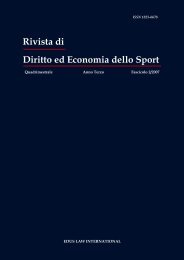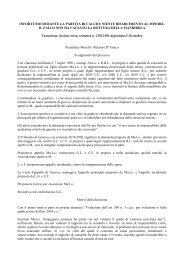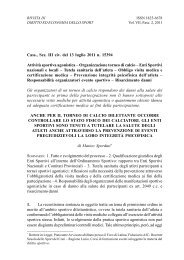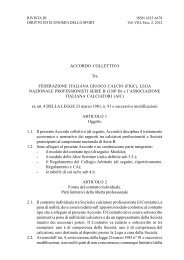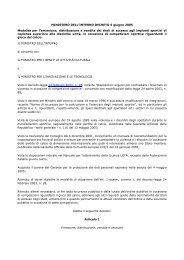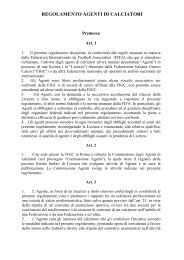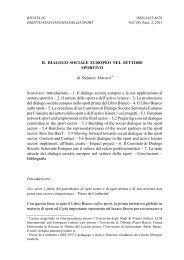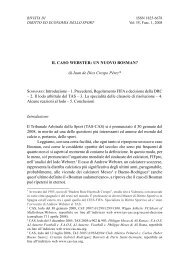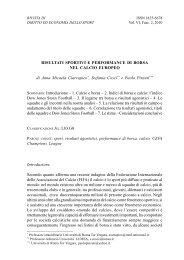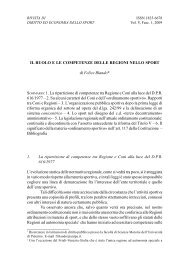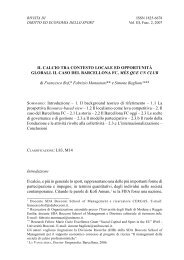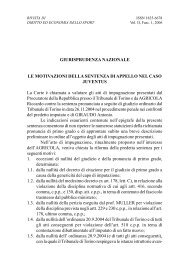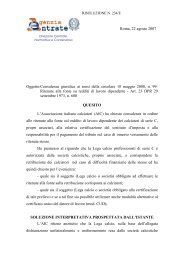Create successful ePaper yourself
Turn your PDF publications into a flip-book with our unique Google optimized e-Paper software.
Globalization of the sports economy 29<br />
product created w<strong>it</strong>h the contesting club). An Italian football stadium may attract<br />
some foreign spectators, namely some European (non Italian) fans when a<br />
Champions League match is offered, but on average they are few compared to the<br />
Italian fans. On the other hand, a club’s indirect product is the sport show that can<br />
be broadcast and, by the same token, can meet instant globalization of <strong>it</strong>s TV<br />
viewers. Champions League matches are broadcast far beyond European borders.<br />
Globalization of derived products such as merchandising, club touring for<br />
demonstration matches in Asia and so on, is also easy to achieve for spreading the<br />
number of club’s fans all around the world, as for instance Manchester Un<strong>it</strong>ed is<br />
used to do. However, <strong>it</strong> is globalization of <strong>it</strong>s major factors of production and<br />
finance which transforms a European football club playing in the Champions League<br />
into a MNC. Such clubs are used to fielding squads w<strong>it</strong>h players of different<br />
national<strong>it</strong>ies (once Chelsea FC played a match in which they fielded players from<br />
eleven different countries) and to hire foreign coaches and managers. Their labour<br />
force is multinational. In relation to finance, a significant evolution occurred when<br />
a so-called SSSL model of financing from the 1980s and before vanished – in<br />
which the major sources of finance were the spectators (gate receipts), subsidies<br />
and sponsors of local or domestic origin. 36 Today, all big European professional<br />
clubs have adopted a MCMMG model of finance: the most significant source of<br />
finance defin<strong>it</strong>ely is TV revenues; new incomes are drawn from corporations<br />
(entrepreneurs, oligarchs, etc.) acting as patrons, merchandising and markets –<br />
both labour market on which talents are sold for some revenues and cap<strong>it</strong>al market,<br />
i.e. the stock exchange where some clubs are listed. 37 All these new sources of<br />
finance are potentially or really global. Gate receipts and subsidies are no longer<br />
prevailing modes of finance. W<strong>it</strong>h MCMMG model, there is no reason why players,<br />
coaches, managers, sponsors, patrons, fans and owners would have a same<br />
national<strong>it</strong>y. The contrary is everyday more obvious. Even club ownership is<br />
globalizing: Chelsea FC is owned by a Russian c<strong>it</strong>izen, Manchester Un<strong>it</strong>ed by an<br />
American investment fund, Grenoble Football Club by a Japanese company (Index)<br />
and so on. A logical consequence of professional clubs’ globalization could be the<br />
emergence of a European (world?) league gathering all the best clubs. In 1998,<br />
Media Partners supported by other patrons involved in the media business like<br />
Berlusconi, Murdoch and Léo Kirch, made a proposal to create a European football<br />
Super league comprising 36 of the richest European football clubs. The Super<br />
league was supposed to generate revenues twenty times bigger than that generated<br />
by the UEFA Champions League. Though European, this project was of a global<br />
vintage. Media Partners’ attempt failed because UEFA instantaneously reformed<br />
the Champions League, invested bigger gains to the participating clubs, and accepted<br />
some decision sharing w<strong>it</strong>h them. In basketball however, a European super league<br />
____________________<br />
36<br />
W. ANDREFF, P. STAUDOHAR, The Evolving European Model of Professional Sports Finance, J. of<br />
Sp. Econ., vol. 1, n. 3, 2000, 257-76.<br />
37<br />
M. AGLIETTA, W. ANDREFF, B. DRUT, Bourse et football, Revue d’Economie Pol<strong>it</strong>ique, vol. 118, n.<br />
2, <strong>2008</strong>, 255-296.



